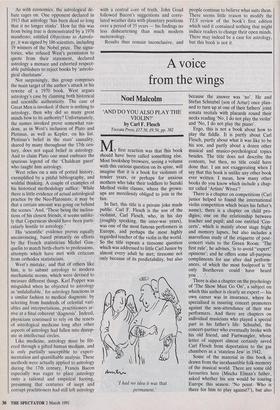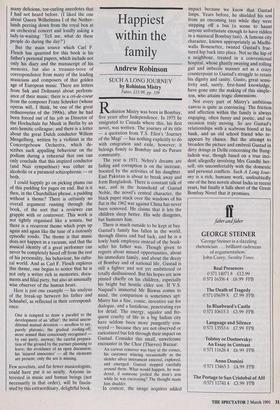A voice
from the wings
Noel Malcolm
`AND DO YOU ALSO PLAY THE VIOLIN?' by Carl F. Flesch Toccata Press, f17.50, f9.50, pp. 382 My first reaction was that this book should have been called something else. Most bookshop browsers, seeing a volume with this curious question on its spine, will imagine that it is a book for violinists of tender years, or perhaps for anxious mothers who take their toddlers to Suzuki Method violin classes, where the grown- ups are mercilessly obliged to join in the fun.
In fact, this title is a private joke made public. Carl F. Flesch is the son of the violinist, Carl Flesch, who, in his day (roughly speaking, the inter-war years), was one of the most famous performers in Europe, and perhaps the most highly regarded teacher of the violin in the world. So the title repeats a tiresome question which was addressed to little Carl Junior by almost every adult he met; tiresome not only because of its predictability, but also `I had no idea it was that permanent.' because the answer was 'no'. He and Stefan Schnabel (son of Artur) once plan- ned to turn up at one of their fathers' joint sonata recitals with placards round their necks reading 'No, I do not play the violin' and 'No, I do not play the piano'.
Ergo, this is not a book about how to play the fiddle. It is partly about Carl Flesch, partly about what it was like to be his son, and partly about a dozen other musical and musico-psychological topics besides. The title does not describe the contents, but then, no title could have done that. I am not exaggerating when I say that this book is unlike any other book ever written. I mean, how many other books do you know which include a chap- ter called 'Artists' Wives'?
There is a chapter on competitions (Carl junior helped to found the international violin competition which bears his father's name); there is a chapter on child pro- digies; one on the relationship between teacher and pupil; and one entitled 'Con- certs', which is mainly about stage fright and memory lapses, but also includes a marvellous study of the etiquette of post- concert visits to the Green Room. The first rule', he advises, 'is to avoid "expert" opinions'; and he offers some all-purpose compliments for use after dud perform- ances, of which the most foolproof is 'If only Beethoven could have heard you . .
There is also a chapter on the psychology of 'The Show Must Go On', a subject on which this author is clearly an expert — his own career was in insurance, where he specialised in insuring concert promoters against the non-attendance of their star performers. And there are chapters on individual musicians who played a special part in his father's life: Schnabel, the concert-partner who eventually broke with his old friend, and Furtwangler, whose letter of support almost certainly saved Carl Flesch from deportation to the gas chambers as a 'stateless Jew' in 1942.
Some of the material in this book is drawn from the inexhaustible folk-memory of the musical world. There are some old favourites here (Mischa Elman's father, asked whether his son would be touring Europe this season: 'No point. Who is there for him to play against?'), but also many delicious, toe-curling anecdotes that I had not heard before. (I liked the one about Queen Wilhelmina I of the Nether- lands peering down from the royal box at an orchestral concert and loudly asking a lady-in-waiting: 'Tell me, what do these people do during the day?') But the main source which Carl F. Flesch has quarried for this book is his father's personal papers, which include not only his diary and the manuscript of his memoirs, but also a treasure-trove of correspondence from many of the leading musicians and composers of that golden age of European music. There are letters from Suk and Dohnanyi about perform- ance of their music; there is a cri-de-coeur from the composer Franz Schreker (whose operas will, I think, be one of the great rediscoveries of the 1990s), after he had been forced out of his job as Director of the Hochschule fur Musik in Berlin by an anti-Semitic colleague; and there is a letter about the great Dutch conductor Willem Mengelberg, written by a violinist in the Concertgebouw Orchestra, which de- scribes such appalling behaviour on the podium during a rehearsal that one can only conclude that this inspired conductor (and Nazi sympathiser) was either an alcoholic or a paranoid schizophrenic — or both.
I could happily go on picking plums out of this pudding for pages on end. But is it then, in the Churchillian phrase, a pudding without a theme? There is certainly no overall argument running through the book, of the sort that a reviewer can grapple with or controvert. This work is not tightly organised like a sonata, but there is a recurrent theme which pops up again and again like the tune of a riotously episodic rondo. The theme is that music does not happen in a vacuum, and that the musical identity of a great performer can never be completely hived off from the rest of his personality, his behaviour, his cultu- ral world. And as Carl F. Flesch explores this theme, one begins to notice that he is not only a writer rich in memories, docu- ments and filial piety, but also an unusually wise observer of the human heart.
Here is just one example — his analysis of the break-up between his father and Schnabel, as reflected in their correspond- ence:
One is tempted to draw a parallel to the development of an 'affair': the initial uncon- ditional mutual devotion — needless to say, purely platonic; the gradual cooling-off, more sensed than consciously recognised by one party, anyway; the careful prepara- tion of the ground by the partner planning to leave; the avoidance of an open discussion; his 'injured innocence' — all the elements are present; only the sex is missing.
Few novelists, and far fewer musicologists, could have put it so neatly. Anyone in- terested in music and human beings (not necessarily in that order), will be fascin- ated by this extraordinary, delightful book.



















































 Previous page
Previous page